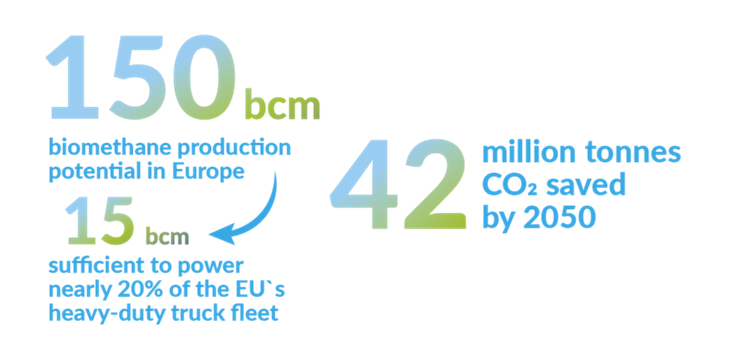
Brussels,1 December 2022 – The European Gas Vehicles Association, NGVA Europe has launched a Carbon Neutral Roadmap to 2050 to deliver the Green Deal and achieve net zero CO2 emissions in commercial road transport with biomethane. The Roadmap disclosed today is the foundation pillar of the industry’s flagship initiative Gmobility - renewable gas in transport. To reach the Net Zero targets set by the EU, the share of biomethane has to be increased in line with the estimated demand supplied to the Heavy Duty Vehicle (HDV) sector: biomethane blend rates of 55% by 2030, 75% by 2040 and 100% (15 billion cubic meters) by 2050. The Roadmap comes at the right time: the European Commission will soon present its proposal on the revision of the CO2 regulation for heavy-duty vehicles, which will include new targets for 2035/2040 and consider renewable fuels for compliance.
“The transport sector has so far not reduced its CO2 emissions since 1990. To achieve the Green Deal targets, we need to proceed with urgency and ambition. Juggling between Net Zero, security of energy supply and ensuring competitiveness of EU’s long-distance haulage sector is a mammoth task – but the Green Deal will fail without a faster uptake of renewable and CO2-neutral gaseous fuels”, said Timm Kehler, President of NGVA.
NGVA Europe’s Secretary General, Matthias Maedge added: “Carbon neutrality is not depended on a certain technology, but rather the speed of adoption. Gas trucks are addressing the CO2 problem now, not tomorrow. Our industry is ready to power up the bioLNG and bioCNG rollout, now we need to see that policy makers follow suit.”
Giulia Cancian, Secretary General of the European Biogas Association (EBA), said: “NGVA Europe’s Roadmap is an important commitment towards the much-needed de-fossilisation of EU transports. Biomethane is the most competitive and readily available renewable gas solution, and our value chain stands ready to deliver on a vast sustainable biomethane potential reaching 151 bcm a year by 2050. Sustainable biomethane will enable the decarbonisation of several sectors including transport.”

Heavy-duty trucks carrying heavy loads over longer distances account for 25% of the European fleet, but are responsible for emitting 75% of the CO2 bill. This is the situation where gas trucks perform at their best and other alternatives are not feasible in the foreseeable future. Amidst a global fuel and energy crisis, carbon neutrality in road transport cannot be achieved with a single technology. Further diversification with renewable gas will accelerate the greening of the HDV sector, as opposed to a unilateral tailpipe focus with an uncertain outcome for the planet. Rapid scalability of available solutions is key, with bioCNG and bioLNG being the most readily available pathway to deliver the fit for 55 target by 2030. The full realisation of such an ambition would result in 42 million tonnes of CO2 saved, per year, by 2050.